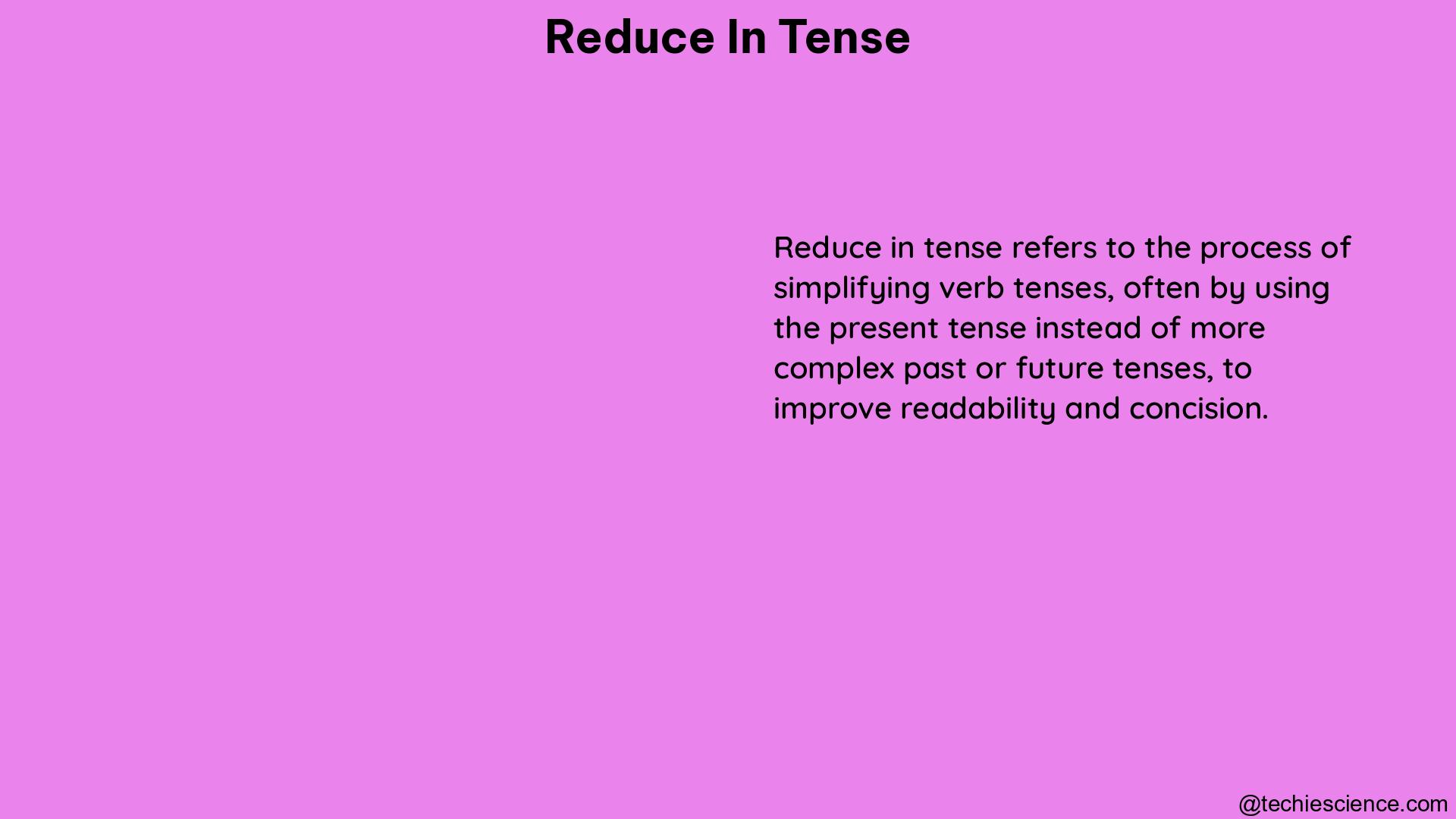The verb “reduce” is a versatile and commonly used word in the English language. Its conjugation follows specific patterns across various tenses, including present, past, and future forms. In this comprehensive guide, we will delve into the advanced details of “reduce” in different tenses, exploring the intricate grammatical specifications that govern its usage.
Present Tense
Indicative
- I reduce
- You reduce
- He/She/It reduces
- We reduce
- You reduce
- They reduce
Present Continuous
- I am reducing
- You are reducing
- He/She/It is reducing
- We are reducing
- You are reducing
- They are reducing
Past Tense

Indicative
- I reduced
- You reduced
- He/She/It reduced
- We reduced
- You reduced
- They reduced
Past Continuous
- I was reducing
- You were reducing
- He/She/It was reducing
- We were reducing
- You were reducing
- They were reducing
Future Tense
Indicative
- I will reduce
- You will reduce
- He/She/It will reduce
- We will reduce
- You will reduce
- They will reduce
Future Continuous
- I will be reducing
- You will be reducing
- He/She/It will be reducing
- We will be reducing
- You will be reducing
- They will be reducing
Perfect Tenses
Present Perfect
- I have reduced
- You have reduced
- He/She/It has reduced
- We have reduced
- You have reduced
- They have reduced
Present Perfect Continuous
- I have been reducing
- You have been reducing
- He/She/It has been reducing
- We have been reducing
- You have been reducing
- They have been reducing
Past Perfect
- I had reduced
- You had reduced
- He/She/It had reduced
- We had reduced
- You had reduced
- They had reduced
Past Perfect Continuous
- I had been reducing
- You had been reducing
- He/She/It had been reducing
- We had been reducing
- You had been reducing
- They had been reducing
Future Perfect
- I will have reduced
- You will have reduced
- He/She/It will have reduced
- We will have reduced
- You will have reduced
- They will have reduced
Future Perfect Continuous
- I will have been reducing
- You will have been reducing
- He/She/It will have been reducing
- We will have been reducing
- You will have been reducing
- They will have been reducing
Modal Verbs and Contractions
Modal Verbs
- Can reduce
- Could reduce
- May reduce
- Might reduce
- Shall reduce
- Should reduce
- Will reduce
- Would reduce
- Must reduce
- Ought to reduce
Contractions
- I’ll reduce
- You’ll reduce
- He’ll/She’ll/It’ll reduce
- We’ll reduce
- You’ll reduce
- They’ll reduce
Examples
Transitive
- The new computer system should reduce the number of problems.
- This image is too large, could you please reduce the size?
- Eating well will reduce the risk of heart disease.
Intransitive
- If you reduce a liquid, you boil it to make it thicker.
Advanced Grammatical Specifications
-
Transitivity: The verb “reduce” can be used both transitively and intransitively. In transitive usage, it takes a direct object, as in “The company reduced their workforce.” In intransitive usage, it does not take a direct object, as in “The temperature reduced overnight.”
-
Causative: The verb “reduce” can be used in a causative construction, where the subject causes the object to undergo the action of reducing. For example, “The new policy will reduce the cost of healthcare.”
-
Degree of Reduction: The verb “reduce” can be modified to indicate the degree of reduction, such as “significantly reduce,” “slightly reduce,” or “drastically reduce.”
-
Passive Voice: The verb “reduce” can be used in the passive voice, as in “The number of employees was reduced by the company.”
-
Negation: The verb “reduce” can be negated, as in “The new policy did not reduce the cost of healthcare.”
-
Adverbial Modification: The verb “reduce” can be modified by adverbs, such as “quickly reduce,” “gradually reduce,” or “efficiently reduce.”
-
Idiomatic Expressions: The verb “reduce” is often used in idiomatic expressions, such as “reduce to ashes,” “reduce to rubble,” or “reduce to tears.”
By understanding the advanced conjugation patterns and grammatical specifications of the verb “reduce,” you can effectively communicate your ideas and express yourself with precision in various contexts.
References
- The Conjugator. (n.d.). English verb conjugation TO REDUCE. Retrieved from https://www.theconjugator.com/english/verb/to%2Breduce.html
- WordReference.com. (n.d.). Conjugation of reduce – WordReference.com. Retrieved from https://www.wordreference.com/conj/enverbs.aspx?v=reduce
- Reverso Conjugator English. (n.d.). Conjugate verb reduce | Reverso Conjugator English. Retrieved from https://conjugator.reverso.net/conjugation-english-verb-reduce.html
- Collins English Verbs. (n.d.). REDUCE conjugation table | Collins English Verbs. Retrieved from https://www.collinsdictionary.com/us/conjugation/english/reduce
- Simple English Wiktionary. (n.d.). reduce – Simple English Wiktionary. Retrieved from https://simple.wiktionary.org/wiki/reduce
Hi… I am Sowndharya Jagadeeswaran, a university rank holder in M.A. English Literature. I have also done my master’s in Business Administration. Inquisitive as I am, my interest in action-oriented research helped me publish research papers in reputed journals. Now, as a career, I am an instructor where I teach young and adorable students the intricate technicalities of Public Speaking and Creative Writing. I also enjoy writing articles on topics I specialize and research in.
You can connect with me through LinkedIn.-